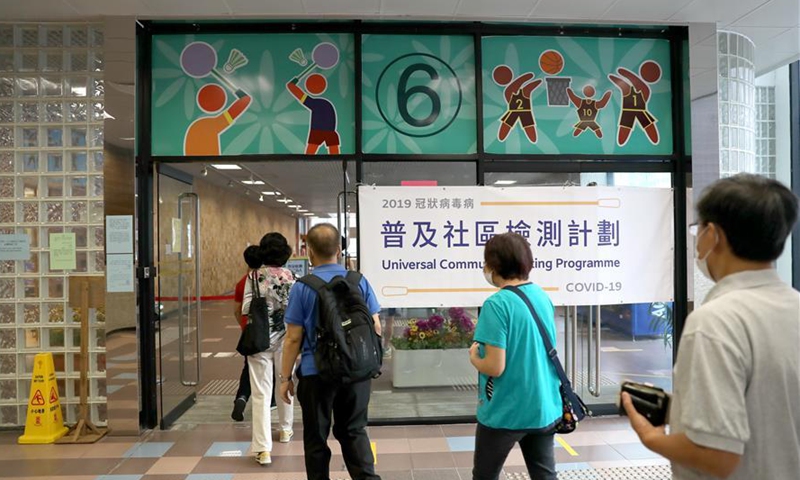Hong Kong's health tracking QR code to debut in one month: expert
By Wang Qi and Leng Shumei Source: Global Times Published: 2020/9/7 19:03:40

Residents enter a gymnasium for COVID-19 testing in Hong Kong, south China, Sept. 4, 2020. Hong Kong launched its massive screening program on Tuesday to help curb the spread of COVID-19 and restore the normal lives of residents. A total of 141 community testing centers have been put into operation across Hong Kong. (Xinhua/Wu Xiaochu)
Hong Kong authorities said that QR health codes for tracking people's health status amid the COVID-19 epidemic are already well-prepared and that they would apply it when the latest spike is under control, predicting that they could complete a mobile phone app within September that tracks local residents' movements and warns them of infection risks.
The Hong Kong Innovation and Technology Bureau (ITB), which is in charge of the system, said in an email to the Global Times on Monday that they would keep in close negotiations with related authorities in Shenzhen and make an arrangement regarding the system depending on the epidemic situation on both sides.
The QR health code system is aimed at facilitating residents in cross border travel, to revive Hong Kong's economy and livelihood by helping residents get exemptions from 14-day quarantine through mutually recognized nucleic acid testing results, the ITB said, noting that they understand local residents look forward to restoring travel between Hong Kong, the mainland and Macao as soon as possible.
The remarks came after Alfred Sit Wing-hang, the secretary of the bureau, said on Saturday that the Hong Kong regional government will officially release and assign the QR code, which was already prepared in June, once the latest domestic resurgence is contained.
While the authorities refused to estimate a clear timing to launching the system, Jin Dongyan, a professor at the School of Biomedical Sciences at the University of Hong Kong, deemed that the authorities will probably not launch the health codes until new infections in the city decline to zero and remain at that level for 7-21 days.
Jin estimated that new infections would not decline to zero until late September.
Hong Kong's health authority reported 11 new domestically transmitted cases on Monday. Although the universal community testing scheme has found some confirmed cases, the daily number of new confirmed cases in the city is still seeing daily double-digit rises, indicating that the transmission chain, especially silent carriers, has not yet been broken.
The third wave in Hong Kong was caused by inbound travelers exempted from quarantine policies. Learning from this experience, authorities have chosen to be cautious in launching the health code policy, as they want to allow residents to commute between Hong Kong and the mainland, but at the same time do not want to impact anti-epidemic work on either side, Jin explained.
In terms of the application process, Sit revealed that Hong Kong residents can use the code to make advance online bookings before receiving a nucleic acid test in designated hospitals. If the result is negative, residents can download the code from the website of the Hong Kong health authority.
Applicants are required to provide personal information such as name, date of birth, ID number, phone number, test results and hospital when passing through customs to the mainland and Macao, Sit noted.
If applicants agree, they will be able to transfer the information contained in Hong Kong's health QR code to the Macao and mainland ones, so as to avoid mandatory quarantine for 14 days after leaving Hong Kong, said Sit, noting the Greater Bay Area in South China is closely interconnected and it is important to resume transit flows as soon as possible.
Authorities in neighboring Macao and Zhuhai have had their QR code systems in place since May 10, the South China Morning Post reported.
In the Chinese mainland, the digital health-tracking system has assigned a QR code to every resident's phone, whose code color changes according to their health status amid the COVID-19 epidemic. A person's code turns green if they are proven to be healthy or uninfected, which allows them to bypass social restrictions in public places, such as shopping, transporting and entertainment venues.
A graduate student at Hong Kong Baptist University, among others, is looking forward to the QR code coming into use, as it will make travels between Hong Kong and the mainland much more convenient.
The student, who requested anonymity, is in her third year and has to do her coursework in Hong Kong while completing a short film, which is set in the mainland, to meet the graduation requirement.
"I have been waiting for the code since there have been rumors it is coming out. Otherwise it'll be very hard to graduate on time," she said.
The Hong Kong authorities are also developing an infection risk warning and movement recording application, which the ITB predicted would be complete within the month.
Meanwhile, the app has caused some residents to worry about privacy. In response, the bureau explained that it is aimed to help residents to more effectively record their own movements and grasp their infection risks.
Residents could use the app voluntarily Information would only be recorded in the residents' phones and would not be uploaded to any government or other systems. Neither does the application have a tracking function, the bureau noted.
Posted in: HK/MACAO/TAIWAN